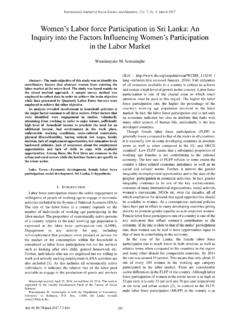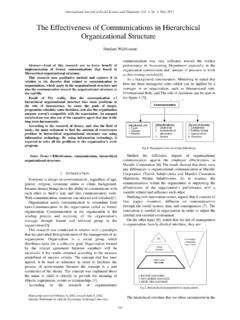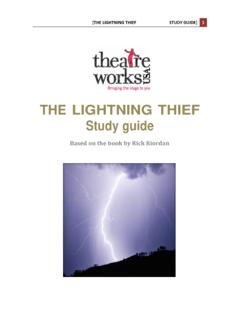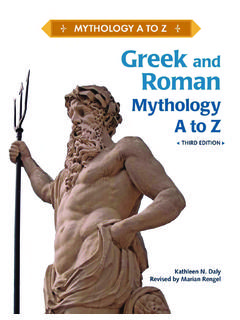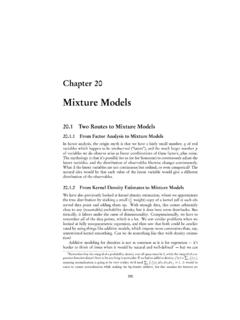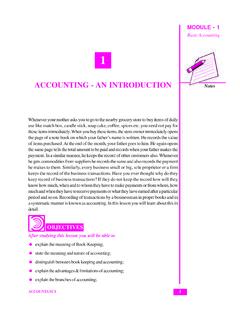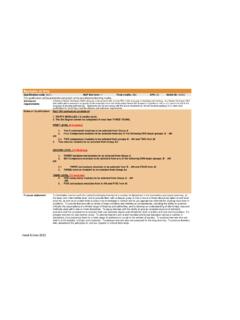Transcription of Menstruation, Religion and Society
1 Abstract All religions of the world have placed restrictions on menstruating women. Be it Judaism, Christianity, Islam, Hinduism or Buddhism. Sikhism is the only Religion where the scriptures condemn sexism and don t impose any restriction on menstruating women. This paper discusses how a menstruating woman is treated and viewed in the major religions. Further it goes on to discuss how Society treats and views menstruating women. The different facets of this topic discussed in the paper are: different euphemisms used for menstruation, sources of information for girls, advertisements and how open we are talking about this natural physiological process. Index Terms Menstruation, women, Society , Religion . I. INTRODUCTION Menstruation is stigmatised in our Society . This stigma built up due to traditional beliefs in impurity of menstruating women and our unwillingness to discuss it normally. We don't know what may have been the reason that forced the holy men to refer to menstruating women as 'unclean'.
2 But all religions (excluding Sikhism) refer to menstruating woman as 'ritually unclean'. The Society shies away from discussing menstruation. This leads to a lot of inconvenience for young girls. They aren't informed well, hence they tend to hold several misconceptions. This paper discusses about the beliefs and norms in different religions and also how Society deals with menstruation. The practices mentioned may not be the norm in every household. The degree of following the rules and the practices followed varies from family to family. It depends on their beliefs and how strongly they hold traditional practices. Since I am a Hindu and reside in a country that is pre-dominantly Hindu I was able to garner more information on Hinduism. Hence I have a relatively longer section dedicated to Hinduism. I will be using information from a survey I conducted. Questionnaires were sent online to 250 girls in the age group of 20-25.
3 150 of them replied back from February 25 to March 25, 2013. I went to different places (shopping complexes, food joints etc.) in Jaipur and Delhi (India) and got 150 questionnaires filled by girls. I also conducted personal interviews with girls from different religions and different parts of India. II. Religion A. Judaism The Jewish code of law, Halakha, details strict rules Manuscript received June 5, 2013; revised August 2, 2013. Aru Bhartiya is with the Indian Institute of Technology Roorkee, India (e-mail: governing every aspect of the daily lives of Jews, including their sexual lives. It prohibits literally any physical contact between males and females during the days of menstruation and for a week thereafter [1], [2]. The entire period of time, from the beginning of the menses to the end of seven clean days, when the women immerses herself in the ritual bath, is called the Niddah period [3]. The Book of Leviticus is the third book of the Hebrew Bible and the third of five books of Torah.)
4 In the chapters on Unclean discharges , Sexual behavior and Grave Crimes 1 we find mention of the following: z In Leviticus 15:19 and 24 we are told: If a woman has an emission, and her emission in her flesh is blood, she shall be seven days in her (menstrual) separation, and anyone who touches her shall be tamei (interpreted as ritually unclean commonly by people) until if any man lie with her at all and her (menstrual) separation will be upon him, he will be tamei for seven " z Leviticus 18:19 warns: "Also you shall not approach a woman in the tum'ah of her (menstrual) separation, to uncover her nakedness." z Leviticus 20:18 states: "And if a man lie with a menstruating woman and reveal her nakedness, and she revealed the fountain of her blood, both of them will be cut off from among their people." The first law talks about how the women and the one who touches her during her menses are ritually unclean.
5 The next two laws explicitly state that one may not have intercourse with her. There is also a mention of woman s separation from others that occurs after giving birth: for a daughter, the mother is separated from others for fourteen days, and then is fully clean after 66 days, she may then bring a sacrifice to the temple. For a son, she is separated for seven days, and then waits thirty-three days. According to a ritual, an Orthodox Jewish wife is responsible for immersing in the Mikvah, the ritual bath, and only then will she become ritually clean . B. Christianity The history of menstrual taboo has been a major reason to keep women from positions of authority in Christianity [4]. Just like in Judaism it s the belief of many Catholics that woman should not have sexual intercourse during her menses. In the Eastern Orthodox Christian Church, menstruation is considered unclean. Partaking of sacraments, especially communion, or touching holy items like Bible or religious 1 Unclean discharges ( ), Sexual behavior ( ) and Grave Crimes ( ) Menstruation, Religion and Society Aru Bhartiya 523 International Journal of Social Science and Humanity, Vol.
6 3, No. 6, November 2013 DOI: are not allowed for menstruating women. This is not a universal practice, but it hasn t gone away entirely. Russian Orthodox Christians believe in menstrual taboos. Menstruating women have to live in secluded huts during this time. They don t attend church services, cannot have any contact with men, and may not touch raw or fresh food. A menstruating woman s gaze is also thought to affect the weather negatively [5]. While western Christian denominations are less extreme, some negative attitudes still remain. C. Islam In the Quran, 2:222 reads, They ask you about menstruation. Say, It is an impurity, so keep away from women during it and do not approach them until they are cleansed; when they are cleansed you may approach them as God has [6]. This clearly shows that Quran only stipulates one prohibition for menstruating women, which is abstinence from sexual activity.
7 Some interpreters have expanded upon this concept to state that, menstruating women have to stay away from their male family members. Also, an interviewee stated that, one is not allowed to read the Arab Quran but can read from the translations in other languages. From what I gathered after interviewing a few people is, that in Islam menstruating women aren t supposed to touch the Quran, enter the mosque, offer the ritual prayer or have sex with her husband for seven full days. The woman is exempted from rituals such as daily prayers and fasting, although she is not given the option of performing these rituals, even if she wants to [7]. Like Judaism the woman has to complete a ritual washing before she becomes clean again. D. Buddhism From a Buddhist point of view menstruation is a natural physical excretion that women have to go through on a monthly basis, nothing more or less. 2 However in practice this is not followed.
8 It is because of the influence Hinduism has had on Buddhism. Many temples do not allow women to circumambulate around the Stupas. There is clear evidence of this rule in Thailand. During menstruation women are thought to lose Qi (commonly spelled as chi, is believed to be part of everything that exists, as in life force , or spiritual energy.) There s a Buddhist belief that ghosts eat blood. A menstruating woman is then thought to attract ghosts, and is therefore a threat to herself and others. An example cited by the Buddha Dharma Education Association says, that while fermenting rice, menstruating women are not allowed near the area or the rice will be spoilt. E. Sikhism Guru Nanak, the founder of Sikhism, condemned the practice of treating women as impure while menstruating. Menstruating women are allowed to visit Gurudwaras 2 This is from an answer by Buddha Dharma Education Association to the question: It is commonly believed that women are unclean.
9 How true is this belief? This question was asked in Women in Buddhism: Questions & Answers,2004,BuddhaNet. , Available: (religious place of Sikhs) and offer prayer. There is no restriction to movement in the house or outside. Guru Granth Sahib (Sikh scripture) boldly rejects sexism. It affirms women s creative and natural processes in the social fabric. It condemns the taboos surrounding menstruation and post-partum pollution. Rather, menstruation is regarded as an essential and natural process [8]. Guru Nanak openly chides those who attribute pollution to women because of menstruation and asserts that pollution lies in the heart and mind of the person and not in the cosmic process of birth [9]. A girl I interviewed said, Ours is a fairly new Religion compared to others so no mythological concepts or superstitions are present. We are allowed to visit our religious places, go to kitchen etc.
10 Everywhere. But out of respect for Hindu s beliefs I don t go inside the Hindu temple during my period. F. Hinduism In Hindu mythology it s believed women got Rajaswala Dosha (menstruation) when Lord Indra (the king of gods) severed the head of Vishwaroopacharya (the second teacher of the gods). Since Lord Indra killed a Brahmin he got Brahmahatya dosha . 3He got rid of it by distributing it amongst the prithvy (land), samudra(water),vriksha( tree )and stree (women folk) [10]. The women from that day on started menstruating every 28-30 days and got the ability to give birth. Hence it s believed that menstruation is a dosha. In Indian yogic philosophy there are three gunas (or qualities). These are tamas (black), rajas(red) and sattva (white). Anything that is an excretion from the body sweat, blood, tears etc. are toxic and are hence classified under tamas.




